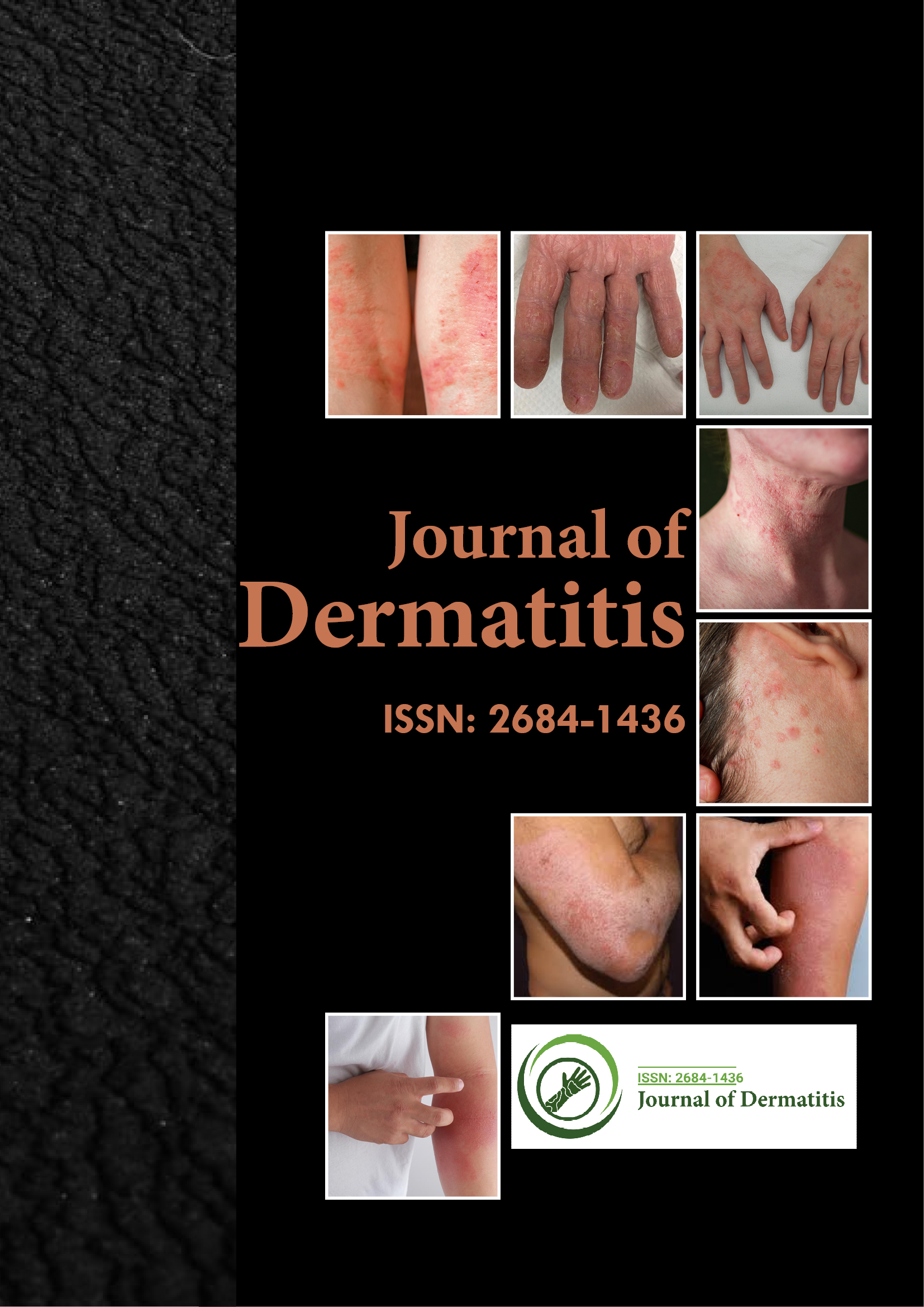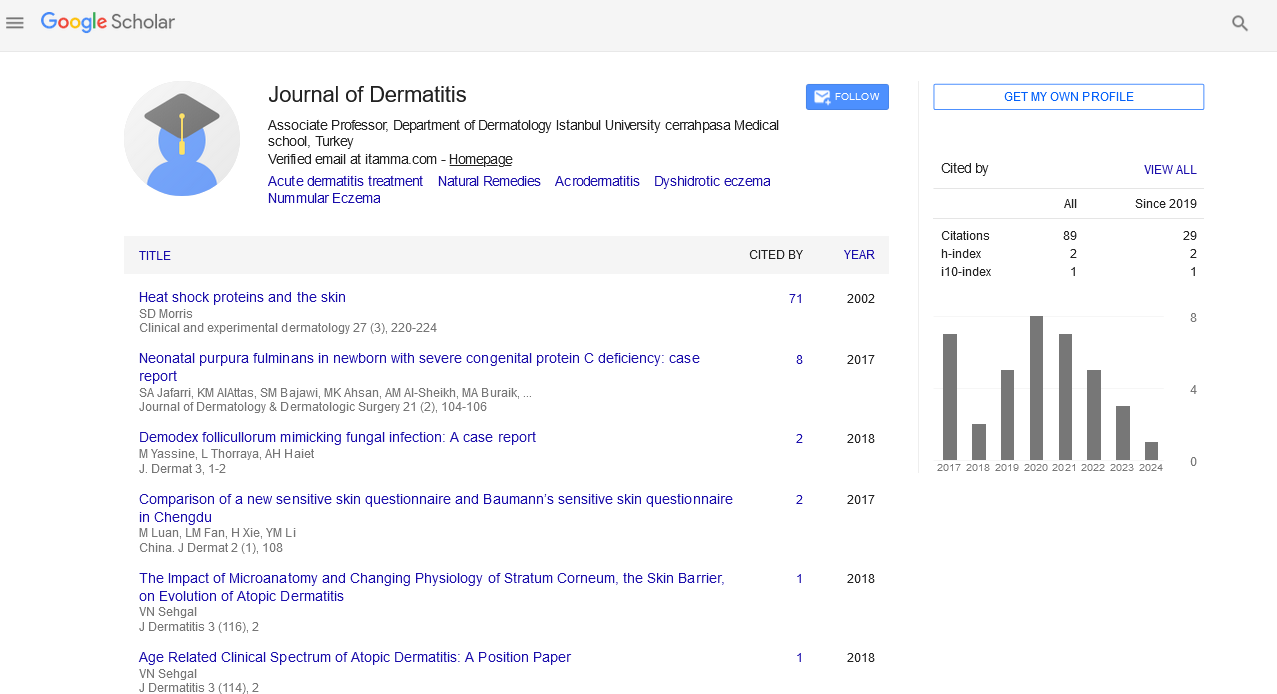Indexed In
- RefSeek
- Hamdard University
- EBSCO A-Z
- Euro Pub
- Google Scholar
Useful Links
Share This Page
Journal Flyer

Open Access Journals
- Agri and Aquaculture
- Biochemistry
- Bioinformatics & Systems Biology
- Business & Management
- Chemistry
- Clinical Sciences
- Engineering
- Food & Nutrition
- General Science
- Genetics & Molecular Biology
- Immunology & Microbiology
- Medical Sciences
- Neuroscience & Psychology
- Nursing & Health Care
- Pharmaceutical Sciences
Opinion Article - (2023) Volume 8, Issue 6
Molecular and Cell-Mediated Pathways in the Epidemiology of Psoriasis
Strna Rios*Received: 17-Aug-2023, Manuscript No. JOD-23-23548; Editor assigned: 21-Aug-2023, Pre QC No. JOD-23-23548 (PQ); Reviewed: 04-Sep-2023, QC No. JOD-23-23548; Revised: 11-Sep-2023, Manuscript No. JOD-23-23548 (R); Published: 19-Sep-2023, DOI: 10.35248/2684-1436.23.8.218
Description
Psoriasis is a chronic inflammatory skin condition that affects millions of people worldwide, with a profound impact on their quality of life. While the exact cause of psoriasis remains elusive, extensive research has intricate interplay of molecular and cellmediated pathways in its epidemiology. Understanding these pathways is pivotal for the development of effective treatments and management strategies for this complex disease.
Psoriasis is characterized by the rapid and abnormal proliferation of skin cells, resulting in the formation of thick, scaly plaques on the skin's surface. This process is closely linked to immune dysregulation, with both innate and adaptive immune responses plays a key roles in disease pathogenesis. The most common form of psoriasis is psoriasis vulgaris, which is typically associated with an overactive T-cell response.
Genetic predisposition is one the molecular pathway in which genetic factors plays a significant role in psoriasis. Multiple genes have been identified, and a family history of the disease is a known risk factor. The HLA-Cw6 allele, for instance, is strongly associated with psoriasis susceptibility. These genetic predispositions can influence the expression of various cytokines, cell surface molecules, and immune receptors, contributing to the development of psoriatic lesions.
Cytokines and inflammation is one the molecular pathway in which dysregulated cytokine signaling is a hallmark of psoriasis. Tumor Necrosis Factor-Alpha (TNF-α), Interleukin-17 (IL-17), and Interleukin-23 (IL-23) are key players in driving the inflammatory response. These cytokines promote the activation and proliferation of keratinocytes in the skin, leading to the characteristic psoriatic plaques. Targeted therapies, such as TNF- α inhibitors and IL-17/IL-23 blockers, have revolutionized the treatment of psoriasis by modulating these molecular pathways.
Keratinocyte hyperproliferation is one the molecular pathway in which abnormal keratinocyte proliferation is a central feature of psoriasis. Dysregulated signaling pathways, including the Mitogen-Activated Protein Kinase (MAPK) and Nuclear Factor Kappa B (NF-κB) pathways, drive excessive keratinocyte growth. Additionally, the Janus Kinase-Signal Transducer and Activator of Transcription (JAK-STAT) pathway is implicated in mediating cytokine signaling in psoriatic skin. Targeting these pathways with specific medications can help control hyperproliferation and alleviate psoriatic symptoms.
T-Cell activation is one the Cell-Mediated Pathway in which psoriasis is characterized by the infiltration of activated T-cells into the skin. These T-cells, particularly Th17 and Th1 cells, produce pro-inflammatory cytokines like IL-17 and Interferon-Gamma (IFN-γ), contributing to the inflammation and keratinocyte proliferation seen in psoriasis lesions. Immune-modulating treatments, including biologics, target T-cell activation and cytokine production to dampen the inflammatory response.
Dendritic cells is one the Cell-Mediated Pathway in which dendritic cells are critical in presenting antigens to T-cells, activating the immune response in psoriasis. Plasmacytoid Dendritic Cells (pDCs) have been implicated in the pathogenesis of psoriasis due to their ability to produce type I interferons. Targeting these cells or their function has become a focus of research for potential therapeutic approaches.
Neutrophils are one the Cell-Mediated Pathway in which neutrophils are abundant in psoriatic lesions, and their presence exacerbates inflammation. They release inflammatory mediators and reactive oxygen species, contributing to tissue damage. The recruitment and activation of neutrophils are tightly regulated by various cytokines, including IL-17. Understanding this aspect of the disease can lead to novel treatment strategies aimed at controlling neutrophil activity.
In conclusion, the epidemiology of psoriasis is a complex interplay of molecular and cell-mediated pathways. Genetic predisposition, cytokine dysregulation, and immune cell activation are central to the disease's pathogenesis. Advancements in our understanding of these pathways have led to the development of targeted therapies that have revolutionized the treatment of psoriasis. Further research into the specific mechanisms involved in psoriasis is ongoing, with the intent of identifying new therapeutic targets and refining existing treatment options. Psoriasis remains a challenging condition, but with continued scientific progress, there is chance for improved outcomes and a better quality of life for those affected by this chronic skin disorder.
Citation: Rios S (2023) Molecular and Cell-Mediated Pathways in the Epidemiology of Psoriasis. J Dermatitis. 8:218.
Copyright: © 2023 Rios S. This is an open-access article distributed under the terms of the Creative Commons Attribution License, which permits unrestricted use, distribution, and reproduction in any medium, provided the original author and source are credited.

